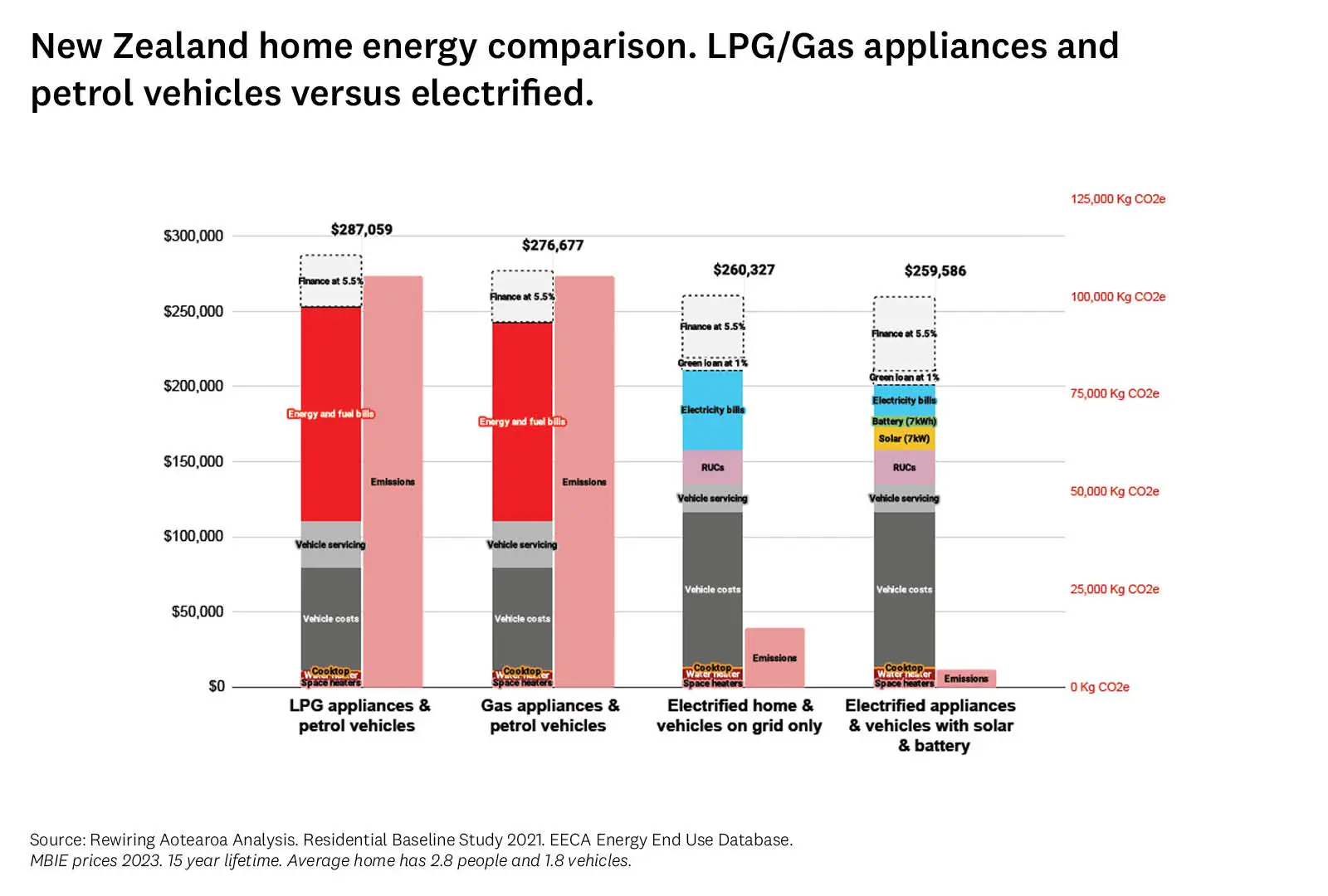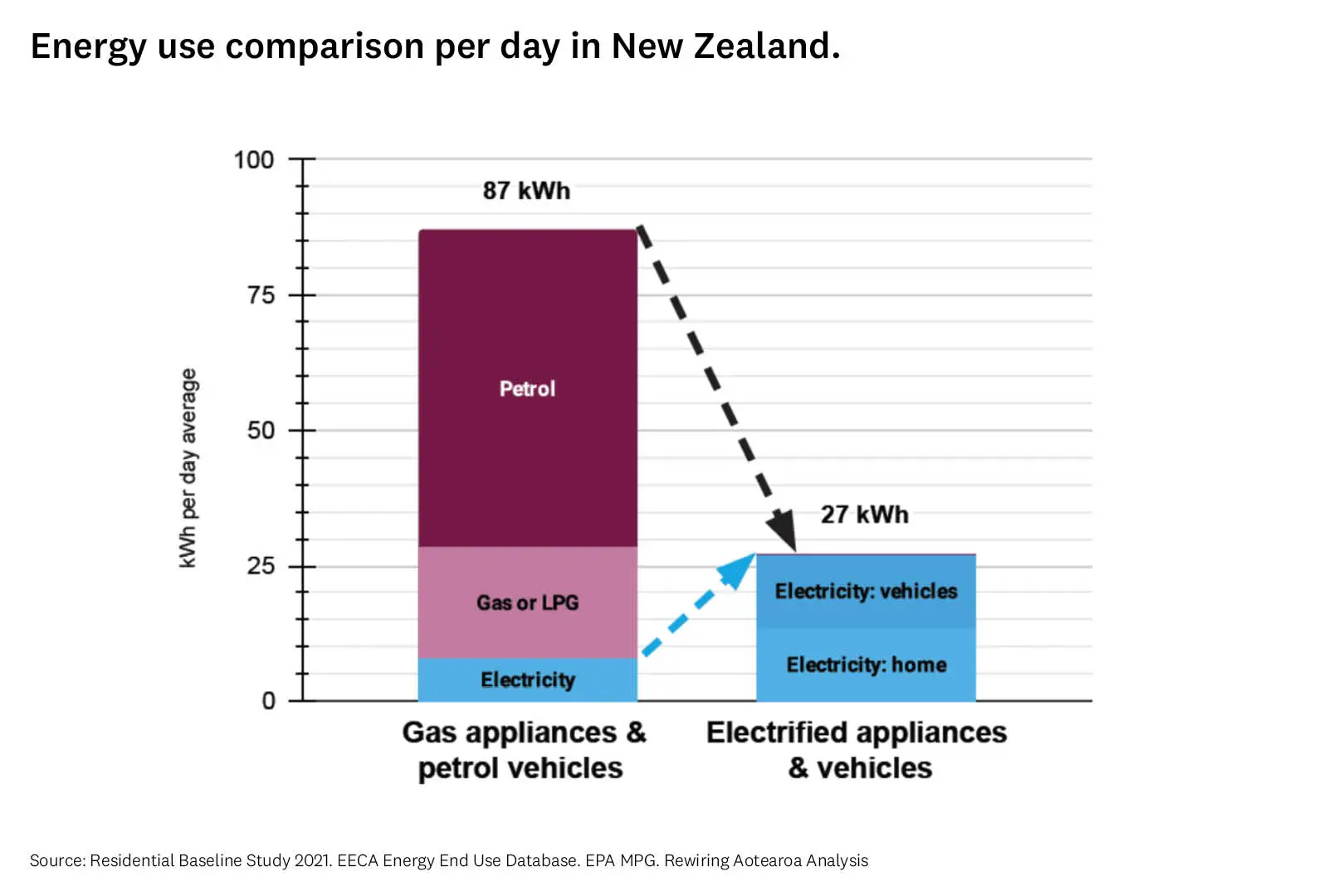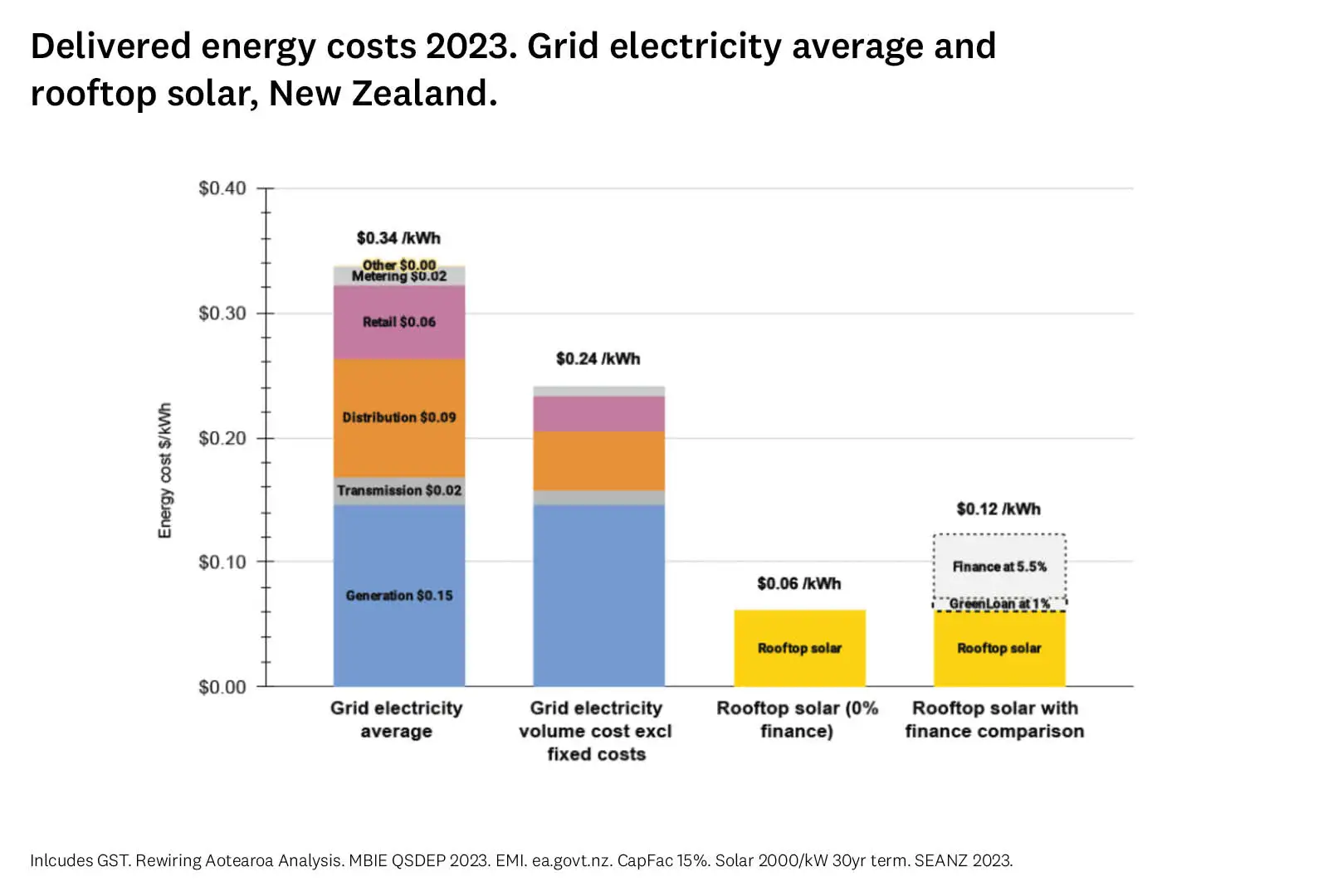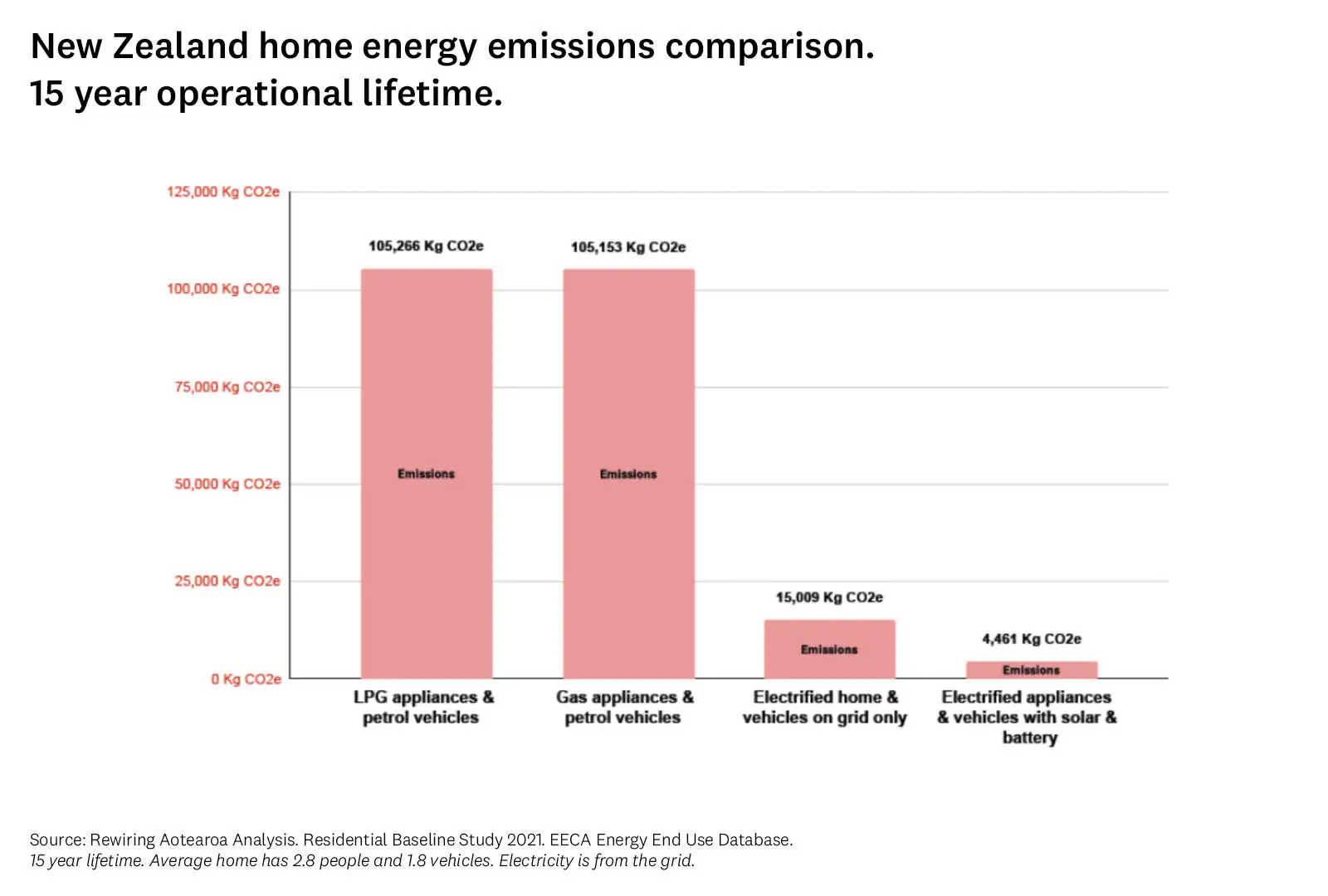The economics of household electrification
While we all use electric appliances in our homes, fossil fuels are widely used by New Zealand households for water heating, space heating, cooking, and, most significantly, driving. But in recent years, the context around household energy use has shifted.
Technology has evolved – we now have access to highly efficient heat pumps, EVs, solar panels and battery storage. There has been an increase in renewable energy powering the grid – in a typical year, New Zealand currently generates around 80-85% of its electricity from renewable energy sources including hydro, geothermal and wind. Further, more New Zealanders than ever are reporting cost of living as affecting energy related choices.
EECA commissioned a technical report delivered by Rewiring Aotearoa, to explore the impact of these changes. The resulting dataset helps show the financial costs and benefits of electricity vs fossil fuels for homeowners in New Zealand, currently considering investing in key appliances, and vehicles. Efficiency and emissions impacts are also explored.
On this page
Research scope and considerations
Scope
Electrification is considered across five focus areas:
- space heating
- water heating
- cooking
- vehicles
- rooftop solar and batteries.
Data inputs reflect an average household – defined as 2.8 people and 1.8 cars. This could similarly reflect a household with 3 people and 2 cars where the per-person and per-car energy consumption is slightly lower than the national average.
The study is based on the current market in early 2024, and the scope is ringfenced to technologies that (a) are proven to work, (b) already exist at significant scale, and (c) can be scaled up. As the technology continues to evolve, and the market changes, we will revisit the findings.
While EECA commissioned the dataset and contributed to the technical modelling, the final inputs and analysis are Rewiring Aotearoa’s.
Considerations
The data shows that the most efficient electrified alternatives are generally more expensive up-front, but have lower running costs. EECA therefore acknowledges that the information will be most useful for New Zealanders with the ability to invest.
The potential benefit of choosing electric appliances or vehicles will be unique to each household. EECA is not suggesting that homeowners immediately replace their household appliances, rather that homeowners should consider the longer-term benefits of investing in electric options when natural replacement windows present.
As is shown in the analysis, vehicle use represents the largest proportion of household energy use, cost, and emissions. This means that the overall results for a fully electrified home are particularly sensitive to assumptions on vehicle use.
In this analysis, energy consumption for household vehicles is based on a top-down calculation which starts from EECA’s Energy End Use Database (EEUD). Per-car, per-year energy use is based on an average which includes both light passenger vehicles and light commercial vehicles. The latter category is included because all utes are classified as light commercial vehicles, irrespective of ownership or use1. Top-down analysis also intrinsically reflects real-world efficiency of the fleet. Other calculations presented on EECA’s websites use a bottom-up approach – based on test-cycle efficiency for vehicles, and assumptions around annual vehicle kilometres. Each approach has strengths and weaknesses.
Key outtakes
For an average home, electrification can be cheaper than fossil-fuelled alternatives.
While electric appliances and vehicles are often more expensive up-front, the modelling reflects that they generally have lower running costs. With all costs considered, over the lifetime of the product, with average usage, the electric option usually works out cheaper. And in some cases significantly so.
An average fully electrified home with rooftop solar will save over $1000 a year compared to a gas and petrol home when all costs are annualised (assuming a 5.5% interest loan on both situations). This rises to savings of over $4000 a year with a low-interest green loan for the fully electrified home.

Fully electric homes use far less energy overall.
Electric appliances and vehicles are significantly more efficient than fossil-fuelled alternatives in most cases. For example, the efficiency difference between fossil-fuelled vehicles and EVs modelled in the report, which is based on a comparison of top-selling non-hybrid petrol cars and comparable EVs, shows that EVs are approximately four times as efficient.
This means that while increased home electrification will result in higher electricity consumption, overall energy consumption will go down, with an average fully electrified home using 27kWh per day compared to 87kWh per day in a gas and petrol home.

Through rooftop solar, households now have access to low-cost delivered energy over many years.
The cost of solar energy has fallen to the extent that it is cost-competitive with most other forms of electricity generation. Households have access to this in the form of rooftop solar, and over the long term this will provide low-cost delivered energy. In the report, this is shown as a delivered energy cost of between 6 and 12 c/kWh, depending on the finance rate. This is based on dividing the capital cost of the solar panels by 30 years of output, allowing for panel degradation and the cost of replacing the inverter. Average grid electricity costs are also shown for comparison, but note that these vary significantly based on location, and on the split between fixed and variable costs for a given pricing plan.
The more electricity a household uses, the more potential rooftop solar holds. As a household transitions from fossil fuels to electricity, its electricity demand will increase – up to three times in the case of conversion from all fossil fuels to all electric. In these instances rooftop solar can play a key role in reducing overall energy costs for households.
Uptake of solar at a household level can also simultaneously benefit New Zealand by removing some of this demand from the grid, and increasing energy resilience.

At scale, household electrification meaningfully reduces New Zealand’s emissions.
By switching to all-electric appliances and vehicles, the average household could save 100 tonnes of CO2 over 15 years.
As noted above, the largest proportion of this emissions reduction comes from replacing fossil-fuelled cars with EVs. Over 15 years, an average non-hybrid petrol car will emit approximately 42 tonnes of CO2, while a grid-charged EV will emit 4 tonnes through electricity generation. This represents an emissions reduction of 38 tonnes per car, and so a total of 68 tonnes for the average household of 1.8 cars considered in the report.
Meaningful emissions reductions are also possible by electrifying household appliances; over 15 years a gas water heater will emit approximately 8 tonnes over of CO2, while an on-grid hot water heat pump will emit approximately 1 tonne. This is a reduction of over 85%.

Download the model behind the report
This Excel spreadsheet was created by EECA from the Google Sheet provided by Rewiring Aotearoa. The presentation of graphs is slightly different from the original due to the different spreadsheet software, but all calculations and results are the same.
Next steps
EECA will continue to unpack the data – including the inputs and assumptions – delivered by Rewiring Aotearoa in this technical report. The model will be used to explore alternate inputs, and household scenarios. The resulting insights will be used to inform EECA’s ongoing ‘efficient homes’ work programme.
When technology changes, or the market changes, EECA will carry out more analysis.
